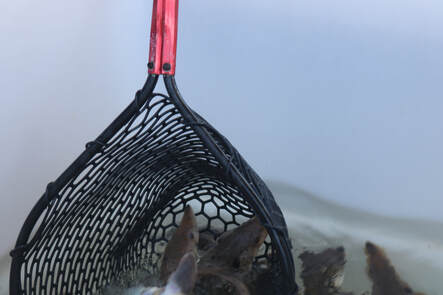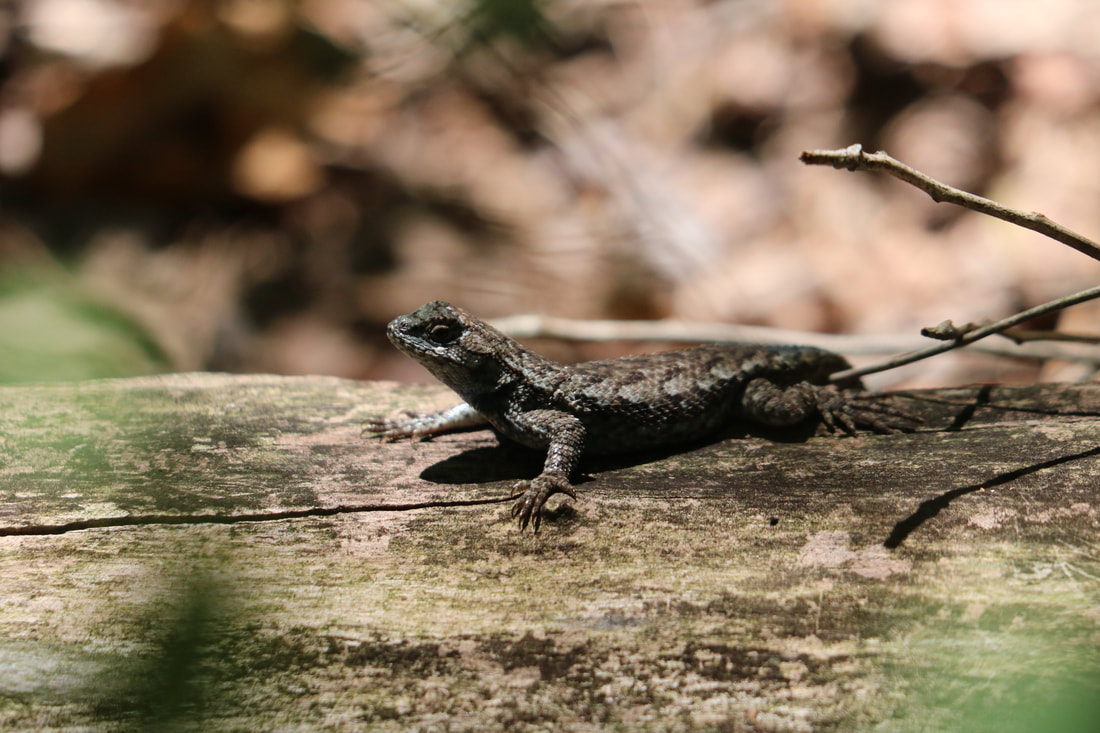Rayz Reviewz
Welcome to Volume 3, Number 10
In this issue, I present my review of the anthology Missing Mountains from Kentuckians for the Commonwealth. The book is not recent, but the conflict described therein continues.
I was honored to be present at the Tennessee Aquarium's release of young sturgeon at Coolidge Park on Earth Day, April 22, 2022. I covered the event for The Hellbender Press.
The Lake Sturgeon were absent from the Tennessee river for decades before the reintroduction program began 20 years ago. The program moves forward as the first batch reaches reproductive age.
Here is a link to my story in the Hellbender Press.
https://hellbenderpress.org/news/sturgeon-release
These sturgeon were later released at Coolidge Park. My review of Missing Mountains follows the image.
Kentuckians for the Commonwealth
Wind Publications
ISBN 1893239497
“This is a collection of writing that remembers the children who do not have good water to drink or bathe in, the people who travel unsafe roads or live beneath sites that have already sent boulders crashing through their homes. This book calls to account a government that prefers to produce coal for our energy-consuming nation in the quickest, cheapest way rather than to find a safe, more efficient, and respectful method, one which would also create jobs for the region. These are writers who support private landowners, independent truckers, and working people, writers who are hopeful of finding a better, less wasteful, and more respectful way of creating a progressive and viable community.” - Silas House.
Silas House wrote these words after participating in the April 2005 Authors Tour of mountaintop removal sites, organized by Kentuckians for the Commonwealth. They conclude his Introduction to the book Missing Mountains. House was one of thirty-five Kentucky authors who toured mining communities in eastern Kentucky to investigate and report on mountaintop removal mining. The tops of mountains are blasted away to allow access to the coal beneath them. The resulting book is a remarkable collection of prose and poetry. The commitment of these writers gives me hope.
Within the pages of Missing Mountains, the reader learns of the history and culture of the Appalachian highlands and the destruction of the landscape, the communities, the people, and the region’s economy. The impacts of mountaintop removal are multigenerational, and the writers traveling and working together should represent a wide range of ages.
The age diversity of this group is best represented by seventy-five-year-old Charles Bracelen Flood and his daughter, twenty-five-year-old Lucy Flood. They were, respectively, the oldest and youngest writers on the team. The stories they tell also illustrate the tragedy of mountaintop removal and the political manipulations of its proponents.
Charles Flood’s article, “Blasted Away,” includes this quotation from Mr. Bill Caylor of the Kentucky Coal Association: “These are the same people who would be outraged if they knew where their ground beef came from.” Flood states that this is a response to the writers’ invasion of the “coal company’s fiefdom,” but it is, in fact, much more than that. It is a typical example of how spokespeople of mining and industry attempt to marginalize their opponents by painting them as not connected to reality.
Flood quickly responded that he is part-owner of a farm where beef cattle are raised for market. He sums up his argument, “I know the difference between traditional agricultural practices and the one-time-and-move-right-on permanent destruction of some of the most beautiful scenery in the United States.”
For her part, Lucy Flood tells the story of “Appalachia Extinct.” Aside from the missing mountains and trees, one small life is missing in her story. That life belonged to a three-year-old boy, asleep in his bed when a boulder crashed through the house and killed him. The boulder was dislodged when a coal company illegally widened a service road above the house. She says, “The coal company appealed the $15,000 fine for the boy’s death.”
These stories are set in Appalachia, and the book would not be complete without the four-part essay by Loyal Jones, illustrating the culture of the mountain people that endure this tragedy. The initial part is titled “Appalachia Meets the Outside World.”
Jones questions the stereotypes of Appalachian people and illustrates the problems imposed on them by the outside world, including both government agencies and coal companies. After exploring “Mountain Humor” and “Mountain Music,” Jones addresses the religious aspects of the struggle in “God and Mountaintop Removal.” Jones provides the backdrop against which the stories and poems take place.
An equally illustrative, though more poignant picture of the mountain peoples’ struggle against the coal companies is provided by poet Gurney Norman in “The Ballad of Dan Gibson,” a true story of holding the land in the face of the strip mining companies. It ends with these stanzas:
“So, they took old Dan to the Hindman jail
But he got out on a sudden bail
Put up by his neighbors and all of his kin
So he could fight the strip-miners again
Dan’s fighting them now, with a thousand others,
Who in this war are all blood-brothers,
Bound to defend each other’s land
From the ruin of the greedy strip-mine band.”
Appropriately, this poem precedes Wendell Berry’s essay, “Compromise, Hell!” Berry, known as the dean of Kentucky writers, also contributed his essay “Contempt for Small Places” and the Afterword to the book. His final paragraph sums up the efforts of the thirty-five writers - many of whom are not cited in this review:
“And so, I return to my opening theme: it is not a vision of the future that we need. We need consciousness, judgment, presence of mind. If we truly know what we have, we will change what we do.”
Notes on selected contributors to Missing Mountains follow this image. These sturgeon are ready for release at Coolidge Park.
Silas House wrote the Introduction. He has published several novels, a play, and shorter works in periodicals. His book, A Parchment of Leaves, received the Award for Special Achievement from the Fellowship of Southern Writers and the Kentucky Novel of the Year Award. It was a finalist for the Southern Critics Book Circle Prize. House served as the Writer in Residence at Lincoln Memorial University and Director of the Mountain Heritage Literary Festival. He has received numerous literary awards. His family has a long history of working in coal mines. He has since edited a new work on mountain top removal titled Something’s Rising.
Wendell Berry wrote the Afterward. He also contributed two essays, “Contempt for Small Places” and “Compromise, Hell!” Both pieces appeared in his book The Way of Ignorance. Mr. Berry has authored over fifty fiction, nonfiction, and poetry books and received numerous awards. He was the keynote speaker at the Conference on Southern Literature in Chattanooga in 2006. Wendell Berry has taught at New York University’s University College (Bronx, New York) and the University of Kentucky. He now lives near his birthplace in Port Royal, Kentucky, where he farms a homestead with his wife, Tanya, who types his handwritten manuscripts on a manual typewriter.
Lucy Flood has authored articles on the web page of Kentuckians for the Commonwealth and her story in the book Missing Mountains. Her work has also appeared in Appalachian Heritage and has since appeared in The Atlantic.
Charles Bracelen Flood (1930 - 2014) wrote on historical topics. He is the author of eleven books, including Lee: The Last Years, Hitler: the Path to Power, and Grant and Sherman: The Friendship that won the Civil War. He is a former President of the Pen America Center, and his biography appears on their website https://pen.org/charles-bracelen-flood-1930-2014/.
Loyal Jones is the retired director of the Appalachian Center at Berea College, Kentucky. The center was named in his honor after he retired. He has authored several books on Appalachian culture, including Hometown Humor, Laughter in Appalachia, and Faith and Meaning in the Southern Uplands. A complete biography appears on the Loyal Jones Appalachian Center web page https://www.berea.edu/appalachian-center/about-loyal-jones/.
Gurney Norman was editor of the Hazard Herald from 1963 until 1965. He authored four novels, including Divine Right’s Trip and Kinfolks. He wrote screenplays for three films and composed several shorter works published in periodicals. He teaches at the University of Kentucky, and his biography appears on their website https://english.as.uky.edu/users/gnorman.
More recent stories are available on the website of Kentuckians for the Commonwealth – http://www.kftc.org. These do not duplicate the material found in the book. The participating authors have spoken in Frankfurt, Louisville, Lexington, and Berea. Kentuckians for the Commonwealth has also organized additional tours and events since the completion of the 2005 tour. The organization remains active today.



 RSS Feed
RSS Feed